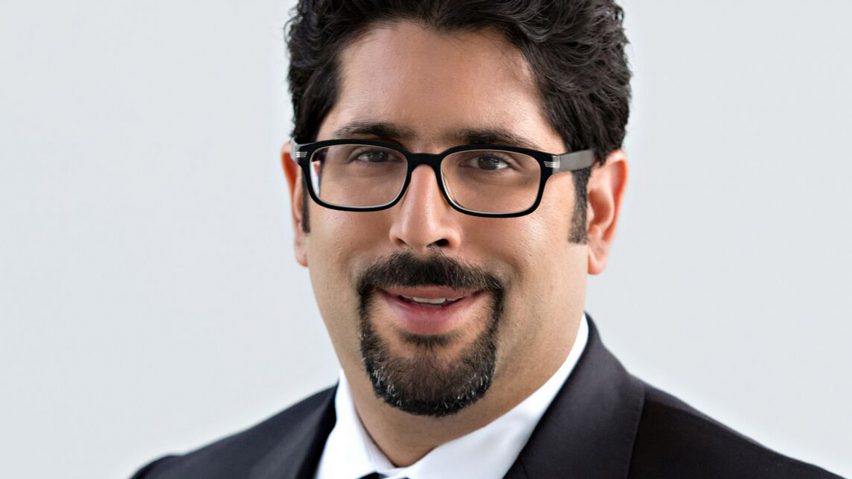
"Average customer doesn't care terribly much about sustainability" says LVMH US head
Louis Vitton, Dior and Tiffany & Co owner LVMH is aiming to become more sustainable – but not because customers are demanding it, explains the CEO of the luxury goods company's North America arm, Anish Melwani, in this exclusive interview.
"Sustainability is something we do not because we think our customers care – we do it because it is existential to our business, on top of being the right thing to do for society," Melwani told Dezeen.
"We know that today the average customer doesn't care terribly much about sustainability," he continued. "They say they do, but when you actually get down to the brass tacks, we don't have people walking into our stores today and asking us, 'Hey, is this done sustainably?' – well, at least not many."
Climate change an "existential" threat
The world's largest luxury conglomerate, Paris-based LVMH Moët Hennessy Louis Vuitton (LVMH) owns 75 brands including many of the world's biggest names in the fashion, alcohol and watches and jewellery industries.
Melwani explained that although sustainability is not currently a driver for sales, he believes that attitudes are changing and that it will become a concern for a growing number customers of LVMH brands.
"We believe that over time, more and more of our customers, as generations progress, will care more about this – they will ask questions, be it in the stores or through online channels – they'll start demanding it," he said.
"And we think that'll be good for us. But we're going to do it anyway."
LVMH is aiming to improve the sustainability of both its stores and supply chain, with fashion reportedly responsible for eight per cent of global greenhouse gas emissions.
According to Melwani, climate change poses an "existential" threat to LVMH, as many of the products created by its brands rely on natural materials. He cited the impact of the growing number of wildfires on its wine businesses.
"[We want to] future proof in many ways," said Melwani. "It's future proofing from a customer perspective, but also future proofing from a practical perspective."
"From a manufacturing perspective, we're vertically integrated," he continued. "If we don't grow grapes in Champagne, we can't make any more Champagne. The French government is not about to expand the limits of the region of Champagne."
"One of the challenges is that we are renters"
Melwani was speaking to Dezeen following the launch of a partnership between the company and Miami Design District that is aiming to reduce the environmental impact of its stores within the district, as part of an ongoing strategy to improve the sustainability of its 5,600 global stores.
The initiative will see its stores in Miami powered by solar by 2025. Melwani said that "all the pieces [had] come together" on the project, but that LVMH faces challenges at the majority of its stores, where the properties are rented.
"One of the challenges is that we are renters – we are tenants in most of our stores – we don't actually purchase our energy directly," he said. "We've been purchasing green energy in the parts of the world where we own the building, and we are able to purchase right from utility."
"We've been doing that for a while," he continued, "But in the vast majority of our stores we are tenants and so it requires this coordination and commitment by the landlord, as well as frankly, having a utility provider that has the right programmes to make this all work."
The company aims to start replicating the Miami partnership with its other landlords in the US and has begun similar initiatives in China and the Middle East.
Melwani added that sustainability was becoming part of the company's messaging, although its brands are not pushing the agenda on their customers.
"The first thing is we believe that attitudes will change over time, and secondly, much the way that we have beautiful art and design in our stores, it's an element of storytelling that becomes part of the brand," he explained.
"Some customers care about the art that they see and ask questions about it and we're able to talk about that – why is that particular art or that artist in that store?" he continued.
"If people ask us about our sustainability methods, we will be able to tell them that this is what we do. But you know, luxury is kind of a fun retail experience. And no one wants to be lectured. No one finds a lecture to be fun."
Earlier this month, British fashion designer Stella McCartney and LVMH presented a market of sustainable material innovations at climate conference COP28. The market showcased 15 innovators that provide plant-based alternatives to plastic, animal leather and fur, as well as regenerative alternatives to traditional fibres.
"The fashion industry accounts for eight per cent of global greenhouse gas emissions," McCartney said. "We need to get creative and innovative with alternatives, moving beyond the limited materials that the industry has been working with traditionally."
"If we can work collaboratively with these goals, we can actually begin doing business in a way that regenerates our planet instead of only taking from it."
The photo is courtesy of LVMH.